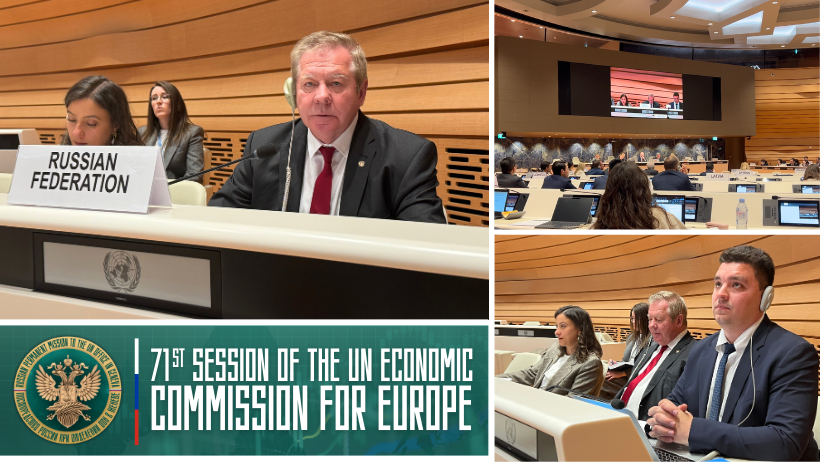UNECE 71st Session

Statement by Russian Permanent Representative to the UN Office and Other International Organizations in Geneva, Ambassador Gennady Gatilov, at the Plenary Meeting of the 71st Session of the UN Economic Commission for Europe (UNECE)
(April 9, 2025, Geneva)
We welcome the High-Level Segment of the 71st UNECE Session under the theme “Climate Action and Resilient Infrastructure for a Sustainable Future”.
Russia is actively implementing internationally agreed measures to combat climate change in the interest of future generations. We have succeeded in reducing greenhouse gas emissions by more than half compared to 1990 levels. The Russian Government has announced the goal of achieving carbon neutrality by 2060.
Currently, 85% of Russia’s energy balance is based on clean, low-emission generation – primarily gas, nuclear energy, and renewable sources. We are expanding our own technologies and production capacities for decarbonization, while also making full use of our natural capabilities. Russia is home to one-fifth of the world’s forest resources, with absorption volumes exceeding 1 billion tons of CO₂ equivalent annually.
Extreme climate events, which are becoming increasingly frequent and intense, lead to physical damage to production and transport infrastructure. Enhancing the reliability of this infrastructure through climate-resilient projects is a key factor in protecting the population, ensuring uninterrupted supply of critical resources and services, and maintaining stable business operations. One of the key ways to implement such projects is through public-private partnerships (PPPs). The Russian Government, in close cooperation with private businesses, is taking specific steps to modernize production facilities and increase their resilience to extreme weather conditions.
Urban planning plays an important role. Measures being implemented in Russia – such as improving energy efficiency, waste recycling, and urban greening – contribute to reducing human impact on natural ecosystems and improving the adaptive capacity of urban infrastructure.
Effective water resource management, reduction and treatment of wastewater discharges are also of great importance. We pay special attention to climate changes that result in large-scale forest loss, soil degradation, and wildfires. Adaptation measures in this area include a broad range of technologies – from reforestation to the introduction of rapid response systems, wildfire localization, and monitoring of illegal logging.
The creation of early warning systems is a key factor for successful adaptation planning. Environmental monitoring systems allow timely preventive measures to mitigate the negative impacts of adverse weather events. In 2022, Russia launched a federal project to establish a unified environmental monitoring system, integrating data on water, soil, air, subsurface resources, greenhouse gas emissions, and sources of environmental pollution. This information base allows for the prompt identification of anomalies in ecosystem conditions and enables swift responses to minimize or eliminate ecological risks.
Mr. President,
UNECE has considerable expert and regulatory capacity and should play a key role in promoting and expanding multilateral cooperation in the interest of sustainable development.
Unfortunately, politicization of UNECE’s work has led to a sharp decline in its relevance as a unique platform for professional dialogue – one of the UN development system’s key regional assets. UNECE’s financial situation is dire, with an unclear path forward. Amid ongoing UN reform discussions, talk has emerged about the need for a “radical optimization” of the Commission’s work, with the possibility of its complete dissolution “as unnecessary”. We are not surprised. In fact, we have been warning about this.
The politically motivated decisions adopted in gross violation of the Commission's mandate and Rules of Procedure – aimed at restricting the participation of Russia and Belarus in UNECE activities – have significantly weakened its resource and expert potential. The responsibility for this lies entirely with the countries blinded by Russophobia, particularly the EU.
Our country has always been a responsible partner and a reliable, predictable donor to the Commission. The projects we finance through UNECE are unconditional and aimed at addressing the most pressing socio-economic and environmental challenges faced by the recipient countries. We remain hopeful for the restoration of constructive cooperation under UNECE’s auspices in the interests of all states in the region. We believe that not all hope is lost.
